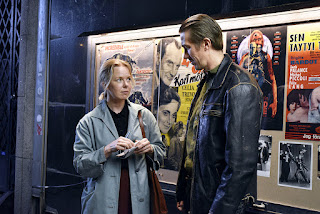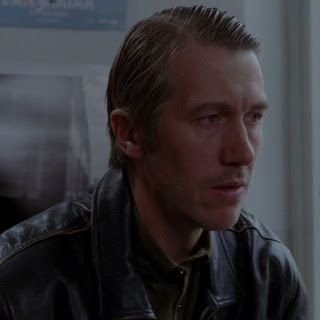Often, I haven't always seen a lot of new movies, usually watching older movies on streaming, but this year had a lot of good stuff come out. I missed other films, but will likely catch them on streaming next year. So these my favorites:
Past Lives (dir. Celine Song)
I saw this while on vacation in Amsterdam, and while I had Dutch subtitles during the Korean language parts, which was challenging for me having only learned Dutch for a few months, I still really loved how this film was quiet and thoughtful, about childhood friends growing up in different countries (him in South Korea, her in Canada), and having had a puppy love phase as kids, and growing more connected through Skype chatting, and Greta Lee as Nora having conflicted feelings over growing apart from Hae Sung (Teo Yoo) while seeing him as her connection to her childhood in South Korea. And when he comes for a visit in New York and she is long married, more confused feelings between them come up, wondering about fate and destiny and what could have been. Lee is is stunning and wonderful in this film, and a more starring role as years in supporting roles in comedies like High Maintenance and Russian Doll. This film felt like a mix of Love & Basketball and the Before series by Richard Linklater, but had this poignant quietness that I really resonated with.
May December (dir. Todd Haynes)
I have seen this twice, and I really liked it a lot both as a comedy making fun of the fragility of white women being manipulative to get their way, as one (Julianne Moore) is a sexual predator who abused a young boy but presents it as a "great love story" to avoid guilt, the other (Natalie Portman) a duplicitous actress studying her and her family to play her in a film to get critical acclaim for herself, and a drama about a young man (Charles Melton0 who was sexually abused as a child and groomed to marry his abuser and have kids with her, and who is coming to terms with his abuse in his 30s as his kids are all young adults and leaving the nest. I've always liked Todd Haynes' films, and like his creative collaboration with Moore and Portman, and seeing a standout performance by Melton, coming fresh off of Riverdale.
No One Will Save You (dir. Brian Duffield)
Kaitlyn Dever was incredible in a dialogue-free tense thriller, playing the town pariah living alone in her childhood home, mourning the losses of her mother and best friend, and being terrified by a home invasion of extraterrestrial aliens, and forcing her to confront her past and what made her a pariah in the first place. Dever was excellent in her physical performance and subtle facial expressions that tell so much of the story, she has this raw scrappiness contrasted with a sweet girlish face that works really well in this role. This film also reminded me a lot of a classic Twilight Zone episode called "The Invaders," and would be a great companion piece to this film.
Rye Lane (dir. Raine Allen Miller)
I really enjoyed this British romantic comedy set in South London among Caribbean communities. A dorky, timid guy named Dom (David Jonsson) is grieving a breakup that happened three months past, and meets a charismatic woman named Yas (Vivian Oparah) by chance, and they spend the day hashing over their exes and goofing around the neighborhood and learning how to move on from their exes and have fun seeing each other. It was witty and breezy, and it had a sequence centered around A Tribe Called Quest's The Low End Theory album, and a karaoke scene with them rapping Salt n' Pepa's "Shoop."
Broker (dir. Kore-eda Hirokazu)
From Kore-eda Hirokazu, the director of Nobody Knows and Shoplifters, is a Korean film helmed by a Japanese director, with similar themes to Shoplifters of a makeshift family of underground criminals and misfits. It features a cast of major film stars, like Song Kang-ho (The Host, Parasite, Snowpiercer), Bae Doona (Sympathy for Mr. Vengeance, Air Doll, Cloud Atlas), and Lee Ji-eun, aka IU (famed South Korean pop star and actress). It's a really interesting film about mothers, adoption, and feeling rejected by society and being outcasts. It centers on two men who run a black market business stealing babies who are placed for adoption in an anonymous baby box, turning them over for a broker price to sell to couples. A baby's mother, a sex worker in a rough situation, wants her baby back, then agrees to be a part of the process selling her baby, as long as she approves of the couple. Plus two detectives are trailing them and setting up a sting operation to bust them. It's an excellent and compelling film to watch.
Spider-Man: Across the Spider-Verse (dir. by Joaquim dos Santos, Kemp Powers, Justin K. Thompson)
The film was fantastic, and so intense to watch with all the different animation styles and comic panels. It's longer than the first, so there's much more going on, especially more with Gwen (big highlight to Hailee Steinfeld in this role). I appreciated that Miles' mom, Rio Morales, got more screentime in this film, it was great to hear Luna Lauren Velez shine in this role. And Daniel Kaluuya as Spider-Punk looked like a punk 'zine cutout come to life, and I loved how Miles kept feeling so envious of his ease with coolness and street London accent. The film gets more complex with the multiverses and Miles growing up more and finding more shades of gray with being Spider-Man, including trying to change the future so that tragedies are not inevitable to a superhero's origin story.
Poor Things (dir. Yorgos Lathimos)
I really liked how this movie starts off with a bonkers premise (a pregnant woman dies by suicide, and a mad doctor transfers her still-living baby's brain to her head so she is resurrected with an infant's brain), and she grows and matures throughout the film, gets into sexual pleasure and hedonism and immaturity, before coming into her own as a philosophical, intelligent young woman who discovers herself, and realizes that all the men around her want to control her, either as a daughter or a wife or a sex plaything. Emma Stone was fantastic in this film, and her evolution of her character of Bella feels natural throughout the film, which is a testament to her talent as an actor.
Bottoms (dir. Emma Seligman)
A really fun queer teen sex comedy starring co-writer Rachel Sennott and Ayo Edebiri as teen girls in this weird, heightened reality of high school where high school football stars are worshipped to a ridiculous degree, always wearing their uniforms, and students run the pep rallies with seemingly no intervention from adult school officials. The girls, PJ and Josie, want to have sex with cheerleaders, so they decide to start a school fight club, lying about having been in juvie fights, with the pretense of teaching self-defense to girls, but really wanting to get close to the girls they want to have sex with, feeling like fighting will raise endorphins and make them horny. It's a goofy premise that ends up leading to girls feeling more self-confidence, becoming friends with each other across clique lines, and the main girls feel moral conflicts about lying while getting close to the girls they like. It's a really fun movie to watch, and I'm looking forward to anything else Seligman has next.
Fallen Leaves (dir. Aki Kaurismaki)
A deadpan Finnish romantic comedy about two working-class stiffs who are struggling to get by, and trying to build a romance with each other, while dealing with conflicts like alcoholism, missed connections, and bouncing around jobs. Both the characters (Alma Poysti, Jussi Vatanen) have this quiet charm about them, as well as a no-bullshit, sarcastic way of delivering lines and being blunt without being hurtful. The film has this feeling of being old-fashioned with her vintage radio and the tube trains, but being current with the news on the Russian invasion of Ukraine, smartphones, and the pair going to see Jim Jarmusch's zombie comedy The Dead Don't Die. There are recurring scenes in a karaoke bar where characters sing old mid-20th century pop crooner songs, and largely seem outside of the main metropolis of Helsinki, living more in the working-class outskirts among dive bars, construction sites, and quiet apartment houses. I just liked how this film felt more quiet and funny and lowkey, and really enjoyed it.
Honorable Mentions: (I liked all these movies, but didn't have strong enough opinions to put them on the Favorite Movies list)
Joyride, Godzilla Minus One, They Cloned Tyrone, Wes Anderson's Roald Dahl Shorts, Barbie














































